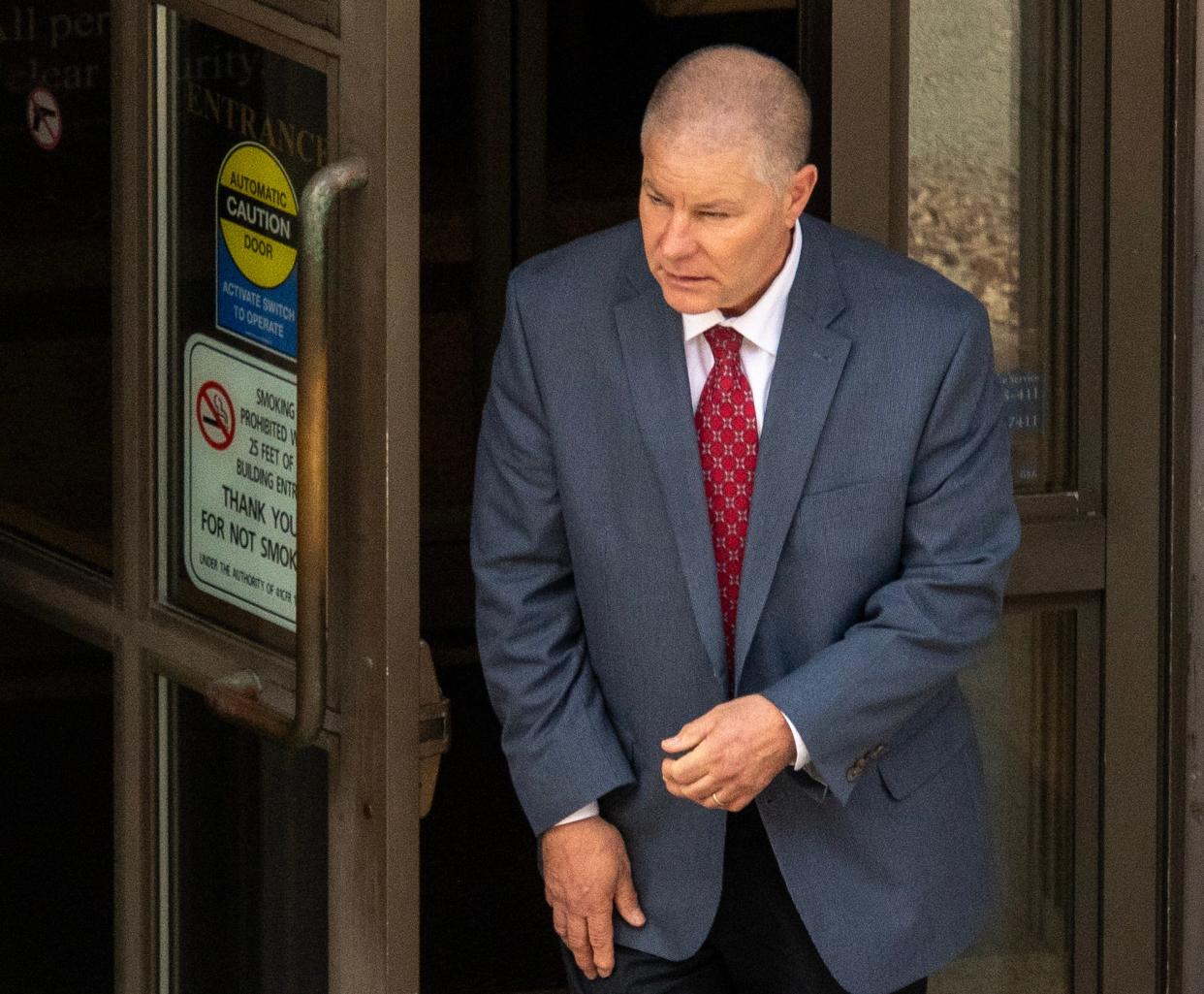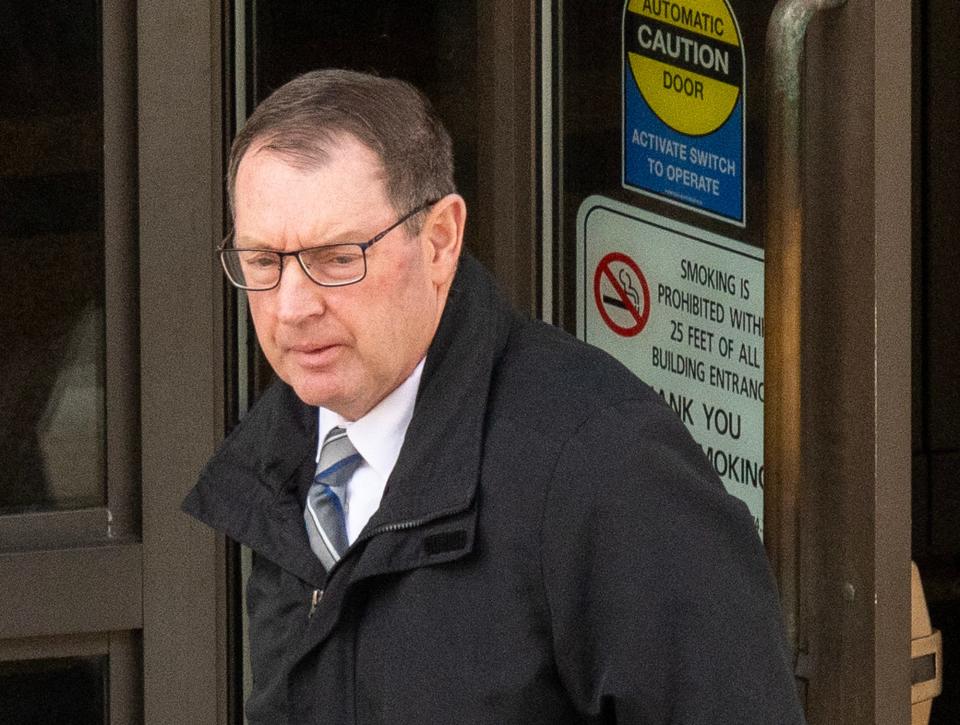Troopers accused of OT fraud: Actions were 'standard practice' at Mass. State Police

WORCESTER — The conduct that led to overtime theft charges against two former state police commanders was “common practice” among troopers for years, their lawyers argued at the opening of their federal trial Tuesday.
Lawyers for the troopers — Lt. Daniel J. Griffin of Belmont and Sgt. William R. Robertson of Westborough — did not contest their clients left federally funded overtime shifts early, but argued others had done so for years and that nobody considered it stealing.
A lawyer for Robertson — accused of ordering a subordinate to shred documents related to the overtime shifts — did not contest the order was given but asserted the documents were “irrelevant.”
The lawyer, Stanley W. Norkunas, suggested Robertson, despite ultimately not believing he’d done anything wrong, may have temporarily panicked in an “emotional” state prior to giving the order.

Griffin and Robertson, the commanding officers of the state police Traffic Program Section, were indicted by federal prosecutors in 2020 in an overtime scheme separate from the larger scandal that led to the disbandment of Massachusetts State Troop E.
Opening statements
In opening statements in U.S. District Court Tuesday, Assistant U.S. Attorney Dustin Chao told a 14-person jury in Worcester’s U.S. District Court that the case was simple.
Griffin, Robertson and several other troopers under their direction, he said, overlapped regular shifts with overtime and left those shifts early in violation of federal law.
“You will conclude stealing is stealing, whether you’re a civilian, noncivilian or a member of the Massachusetts State Police,” Chao said.
The grift, he alleged, took place during seat belt and distracted driving campaigns, as well as drunken driving checkpoints.
Flashing a map of the state onto courthouse monitors, Chao said a bevy of evidence — including data that tracks troopers’ cruiser locations — proves Griffin, Robertson and others lied, over and over, about what hours they worked on documentation.
Prosecutor: They were checking out early
He compared cruiser location data from one day 2016 Robertson worked to the hours he should have been working, saying it showed that the sergeant got home before 5 p.m. despite getting paid for an overtime shift that was to end at 7:30 p.m.
Chao said there should have been hundreds of documents from Robertson and a handful of other troopers regarding the overtime shifts they performed, but that only a dozen or so were ever recovered.
The rest, he said, Robertson ordered destroyed by a subordinate officer.
“Ladies and gentlemen, that is a conspiracy, and that is what the evidence will prove in this case,” Chao said, adding that multiple subordinate officers will testify in the case for the government under immunity agreements.
Norkunas suggested to jurors that Robertson’s order was the result of a man concerned about 30-plus years of admirable service being sullied.
He suggested that the order was the result of a “very emotional” state, but should not be held against Robertson. He suggested evidence at trial would show the information on the shredded forms was memorialized elsewhere, making their destruction “irrelevant.”
Griffin’s lawyer, Thomas M. Hoopes, argued that his client was out on medical leave at the time the order was given.
Hoopes told jurors that the collective bargaining agreement for state troopers is silent on the process for overtime in the grant-funded traffic enforcement programs at issue.
'Gap' in protocol
There was a “gap” in protocol as “wide as the Grand Canyon,” Hoopes argued, and troopers for years had acted as Griffin and Robertson did.
“(This) had been going on for years,” he said, referring to it as “accepted” and “common” practice.
Lawyers for the men noted that in other overtime practices, such as court overtime, troopers are routinely paid for more hours than they appear in court.
They argued that legitimate practices and logistical concerns might cause troopers to end a traffic shift early.
If enforcement during the afternoon was causing traffic to back up, for instance, that might be a legitimate reason to end a patrol early, they said.
“These were troopers who did their jobs,” Hoopes said, arguing that the government, which renewed federal funding used for the enforcement year after year, was pleased with their results.
“Not a one of them thought they were a thief,” he said of the troopers, adding they were following “things they had been taught.”
Evidence opened following opening statements Tuesday, with the government calling one of the former troopers testifying pursuant to immunity.
The trial is expected to last several weeks. Both Griffin and Robertson are charged with one count of conspiracy to steal federal funds, one count of aiding and abetting theft of federal funds and three counts of aiding and abetting wire fraud.
Griffin is facing four additional counts of wire fraud and 11 counts of aiding and assisting in the filing of false tax returns. However those charges were not mentioned to jurors Tuesday, despite being included in prosecutors’ latest jury verdict form from Nov. 20.
Hoopes declined to comment on the other charges his client is facing Tuesday. Spokespersons for Acting U.S. Attorney for Massachusetts Joshua S. Levy did not immediately return a request for comment.
This article originally appeared on Telegram & Gazette: Troopers accused of OT fraud: actions were 'standard practice' at Mass. State Police

